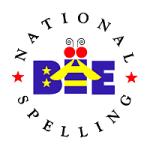Word Routes
Exploring the pathways of our lexicon
National Spelling Bee: Kavya Triumphs!

In the grueling finale of the 2009 Scripps National Spelling Bee, 13-year-old Kavya Shivashankar of Olathe, Kansas emerged as the winner, beating out 10 other frighteningly good spellers. This was her fourth consecutive appearance in the finals of the Bee, and over the years she has gradually crept up to the top spot, moving from 10th to 8th to 4th to 1st place. She was inspired by Nupur Lala, winner of the 1999 competition (and one of the stars of the wonderful documentary Spellbound), and now she joins Nupur in the pantheon of great spellers. Congratulations, Kavya!
The finals, which were broadcast in prime time on ABC, saw some early favorites fall by the wayside: last year's runner-up Sidharth Chand, cool-as-a-cucumber Kyle Mou, and the thoroughly entertaining Kennyi Aouad. That left three spellers in the championship round: Kavya, Aishwarya Pastapur (who, amazingly enough, went to preschool with Kavya), and homeschooler Tim Ruiter.
Aishwarya went out first on menhir, meaning "a tall upright megalith found primarily in England and northern France." That comes from Breton, a Celtic language spoken in the French region of Brittany, where men hir means "long stone." Then Tim lost out on Maecenas, which means "a generous patron especially of literature or art" — an eponym derived from the name of the Roman statesman Gaius Maecenas, apparently a big-hearted fellow. That meant Kavya just had to spell one more word correctly to bring home the big prize. She did just that, spelling Laodicean with ease. Like Maecenas, this is a name from antiquity that got extended to refer figuratively to personal qualities. The Laodiceans were an early Christian community reproached in the New Testament as "neither cold nor hot." Thus, Laodicean came to mean "lukewarm or indifferent in religion or politics."
Kavya's victory was anything but lukewarm, since she so ably outdistanced some very committed spellers. As with the preliminaries, the final rounds contained some fascinating (and confounding) words. Here's my brief recap of the lexical highlights of the finals (see this word list for more):
- For me, the evening got off to a great start with omphaloskepsis
— my favorite word, as I've indicated on my Visual Thesaurus profile page. It's a fancy Greek word for "navel-gazing" and the self-absorbed contemplation that the solitary activity implies.
- Also early on were some words that top spellers in the Visual Thesaurus Spelling Bee might have come across: pogonip ("a dense winter fog containing ice particles"), deipnosophist ("someone skilled at informal chitchat"), and hydrargyrum ("a heavy silvery toxic univalent and bivalent metallic element"). If you manage to get up to the 800-level of the VT Bee, those are some typical toughies that you'll have to struggle with.
- Know your French! There was a preponderance of words derived from French in the final rounds, including avoirdupois ("a system of weights based on the 16-ounce pound"), blancmange ("sweet almond-flavored milk pudding"), grisaille ("chiaroscuro painting or stained glass"), cretonne ("an unglazed heavy fabric"), and oriflamme ("an inspiring symbol or ideal that serves as a rallying point in a struggle").
- Know your Nahuatl! Surprisingly, this Mexican language supplied two words for the finals: axolotl ("larval salamander of mountain lakes of Mexico") and huisache ("tropical American thorny shrub or small tree"). Indigenous peoples of North America were also represented by Anasazi ("a Native American who lived in what is now southern Colorado, Utah, northern Arizona and New Mexico").
- It also helped to know your classical figures of speech. Two rhetorical terms popped up in the final rounds: hypallage ("reversal of the syntactic relation of two words, as in 'her beauty's face'), and antonomasia ("substitution of a title for a name"). Loyal Word Routes readers may recall the latter term from our column on "genericide."
Well, that's all for this year's Spelling Bee. An impressive bunch, as always. I'm sure the kids who aren't graduating from 8th grade yet will start preparing right away for the 2010 contest!


